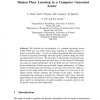Free Online Productivity Tools
i2Speak
i2Symbol
i2OCR
iTex2Img
iWeb2Print
iWeb2Shot
i2Type
iPdf2Split
iPdf2Merge
i2Bopomofo
i2Arabic
i2Style
i2Image
i2PDF
iLatex2Rtf
Sci2ools
SPATIALCOGNITION
1998
Springer
1998
Springer
Human Place Learning in a Computer Generated Arena
We describe the development of a computer-generated arena within which one can study human place learning by asking subjects to locate an invisible target. A series of studies demonstrate that such learning is based on acquiring knowledge about the spatial relations among the distal cues presented in this arena. We show that (1) the presence of proximal cues does not prevent learning about the distal cues; (2) the removal of individual cues does not impair performance until all distal cues are removed; and (3) the re-arrangement of distal cues profoundly impairs performance. In further studies we demonstrate that learning can proceed even when the subject is placed on the target rather than having to navigate to it, and even if the subject merely watches someone else navigate to the target. Finally, we demonstrate that learning is impaired by traumatic brain injury, and that aged subjects do not perform as well as young adults. This paradigm should prove useful in investigations of spa...
Related Content
| Added | 06 Aug 2010 |
| Updated | 06 Aug 2010 |
| Type | Conference |
| Year | 1998 |
| Where | SPATIALCOGNITION |
| Authors | L. Nadel, K. G. F. Thomas, H. E. Laurance, R. Skelton, T. Tal, W. J. Jacobs |
Comments (0)

